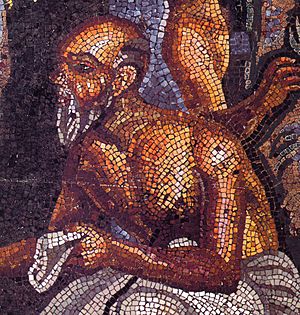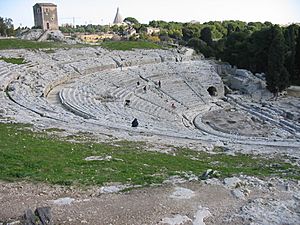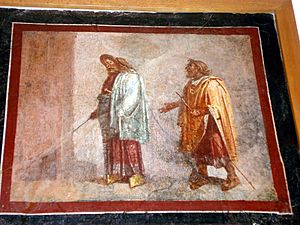Livius Andronicus facts for kids
Quick facts for kids
Lucius Livius Andronicus
|
|
|---|---|

Detail of a poet giving directions from a theatrical scene. Roman mosaic from the tablinum Casa del Poeta tragico (VI 8, 3–5) in Pompeii. Naples National Archaeological Museum.
|
|
| Born | c. 284 BC Tarentum |
| Died | c. 204 BC (aged around 79) Rome |
| Occupation | Writer; playwright; poet |
| Language | Latin |
| Notable works | Latin translation of the Odyssey |
Lucius Livius Andronicus (born around 284 BC, died around 204 BC) was a very important writer in ancient Rome. He was originally from Greece and was brought to Rome as a slave. He later became a freedman, meaning he gained his freedom.
Livius Andronicus was a teacher and a playwright. He is famous for translating the Greek epic poem, Homer's Odyssey, into Latin. This was a huge step for Roman literature. He also wrote the very first plays in Latin, including both serious tragedies and funny comedies. Because of his pioneering work, many people consider him the "father of Roman drama" and of Latin literature. He was the first Roman poet whose name we know.
Contents
About Livius Andronicus
His Name and Background
Livius Andronicus had a name that showed his journey. "Andronicus" was his original Greek name. When he was freed from slavery, he took the family name of his former master, who was from the powerful Roman family called the Livia gens. This is why he became known as Livius.
He was a highly educated Greek. He was likely captured during a war and brought to Rome as a slave. After gaining his freedom, he started a school. He used his translations of Greek works, like the Odyssey, to teach his students.
Important Dates
Livius Andronicus made history in 240 BC. This was the year he put on his very first play in Rome. This event is seen as the start of Roman drama.
He also wrote a special song, called a hymn, in 207 BC. This hymn was for a group of 27 young girls to sing in public. It was performed to honor the goddess Juno during a time when Romans were worried about bad omens. Because this hymn was so successful, Livius Andronicus received special honors. His group of writers and actors was even given a meeting place in the Temple of Minerva on the Aventine Hill.
His Works
The Odusia
One of Livius Andronicus's most famous works is his Latin translation of Homer's Odyssey. He called his version the Odusia. He created this translation mainly for his students.
Only small parts of this translation still exist today. However, it was incredibly important because it made this classic Greek story available to Romans. It also helped to develop Latin as a literary language. Livius Andronicus faced many challenges because there wasn't a tradition of epic poetry in Italy before him. He tried to keep the artistic quality of the original Greek poem while making it understandable in Latin.
His Plays
Livius Andronicus's first play was performed in 240 BC. He was the first to create plays with a clear story in Latin. He was also an actor himself. A famous story says that he once strained his voice while performing. After that, he decided to let professional singers handle the singing parts in plays, while the actors focused only on speaking the dialogue.
His plays included both serious tragedies and funny comedies. The comedies were based on Greek "New Comedy" plays. In these plays, the actors wore Greek costumes. Romans called this type of comedy fabula palliata or comoedia palliata.
We know the names of some of his tragedies, like Achilles, Aegisthus, Ajax with the Whip, Andromeda, and Trojan Horse. For his comedies, we know the titles Gladiolus (meaning "Little Saber") and Ludius.
|
See also
 In Spanish: Livio Andrónico para niños
In Spanish: Livio Andrónico para niños
 | Sharif Bey |
 | Hale Woodruff |
 | Richmond Barthé |
 | Purvis Young |



